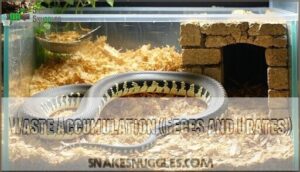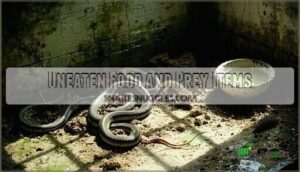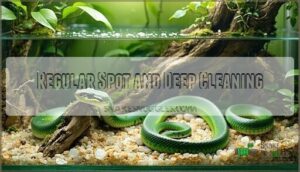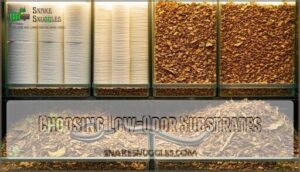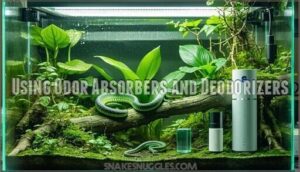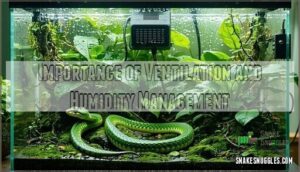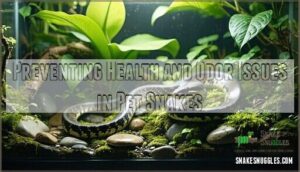This site is supported by our readers. We may earn a commission, at no cost to you, if you purchase through links.
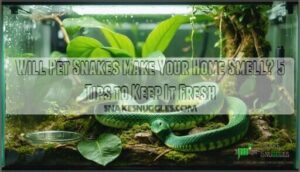
What causes the smell? Usually leftover food rotting, waste buildup, or stale air in the tank. Skip cleaning too long and bacteria multiplies – that’s when things get nasty. Clean up waste immediately, maintain proper humidity, and ensure good airflow.
Here’s what most snake owners learn: these pets are way cleaner than you’d expect, but staying on top of tank maintenance is everything.
Table Of Contents
- Key Takeaways
- Do Pet Snakes Make Your Home Smell?
- Main Sources of Odor in Snake Enclosures
- Effective Odor Control for Snake Owners
- Importance of Ventilation and Humidity Management
- Preventing Health and Odor Issues in Pet Snakes
- Frequently Asked Questions (FAQs)
- What are some common causes of bad odors in snake enclosures?
- How often should snake bedding be changed to prevent odors?
- Can snake skin shedding cause bad smells?
- Do different snake species produce different odors?
- How often should snake bedding be replaced?
- What cleaning products are safe for snakes?
- Do baby snakes smell worse than adults?
- Conclusion
Key Takeaways
- Pet snakes don’t naturally smell – Unlike furry pets, snakes have no body odor since their scaly skin doesn’t trap smells or produce oils like mammals do.
- Clean enclosures prevent all odor issues – You’ll avoid bad smells by removing waste immediately, replacing uneaten food within 24 hours, and maintaining proper ventilation.
- Poor maintenance creates the stink – Waste buildup, rotting food, and bacterial growth from high humidity are what make snake enclosures smell, not the snake itself.
- They’re cleaner than most pets – You’ll find snakes require less odor maintenance than dogs, cats, or fish tanks when you follow basic cleaning schedules.
Do Pet Snakes Make Your Home Smell?
Here’s some good news: pet snakes don’t naturally smell bad at all. They’re actually among the cleanest pets you can have.
Unlike furry friends who can get stinky between baths, snakes have no body odor because their scaly skin doesn’t trap smells like fur does.
Unlike dogs or cats that smell between baths, snakes have no body odor because their scales don’t trap smells like fur does
Natural Odor Levels of Snakes
Snakes themselves are surprisingly odorless reptile species. Unlike mammals, snake skin scent is minimal because they don’t sweat or produce oils. Their keratin-based scales don’t trap animal scent like fur does.
However, snakes do have reptile musk glands that release snake pheromones when stressed. Individual snake odors vary slightly, but healthy reptiles in clean environments produce virtually no smell that’ll make your house stink.
Comparing Snake Odor to Other Pets
If you’re worried about pet smells, snakes are surprisingly clean companions. They produce way less odor than most pets you’d typically consider.
Think about it—dogs and cats need daily grooming and still carry that distinctive pet smell. Snakes? You’re looking at maybe once a week for cage maintenance, and even then, there’s barely any scent.
Parrots are messier than people realize, creating both visual chaos and stronger odors than any snake enclosure. Even fish tanks often smell fishier than a properly maintained snake habitat.
The little musk snakes do produce is so faint you’d hardly notice it compared to typical pet odors. It’s actually pretty remarkable how low-maintenance they are in this department.
Interestingly, cats with their incredible sense of smell can pick up on these subtle scents, which actually makes them useful for detecting unwanted visitors like rodents.
Main Sources of Odor in Snake Enclosures
While your snake won’t smell bad naturally, their enclosure can become quite stinky if you’re not careful about maintenance.
The main culprits are waste buildup, rotting leftover food, and bacteria that love damp, dirty conditions—think of it like leaving dirty dishes in your room for weeks.
Waste Accumulation (Feces and Urates)
Regarding pet reptiles, your snake’s waste creates the biggest smell challenge in any enclosure. Snake feces and urates pack a serious punch – think concentrated ammonia that’ll make your eyes water.
If you own a snake, here’s the truth: waste is your biggest odor battle. Snake poop and urates hit hard – we’re talking eye-watering ammonia levels that’ll clear a room.
Without proper fecal management and waste removal, that smell snowballs quickly. The key to smart enclosure hygiene? Clean up the moment your snake goes. Don’t put off feces disposal until later, or urine odor will dominate your entire space.
Uneaten Food and Prey Items
Leaving uneaten prey items creates a perfect storm for nasty smells in your snake’s home. That leftover mouse or cricket becomes a smelly disaster faster than you’d think, especially in warm enclosures.
- Remove uneaten food within 24 hours to prevent rotting prey control issues
- Store frozen prey items properly and thaw only what you’ll use for feeding frequency schedules
- Plan meals carefully – overfed snakes refuse food, leading to food waste management problems
Smart meal planning strategies and proper prey item storage keep pet odor control simple and your home fresh.
Bacterial and Fungal Growth
Moisture creates a perfect breeding ground for odor-causing microbes in your snake’s home. Poor humidity control and inadequate ventilation allow bacterial cultures to flourish, producing that unmistakable smell.
Too much moisture turns your snake’s enclosure into a bacterial playground. When humidity gets out of hand and air circulation is poor, these microbes multiply fast and create that funky smell nobody wants.
Maintaining a balanced ecosystem, such as a bioactive environment, is vital for preventing the growth of harmful microorganisms.
Effective Odor Control for Snake Owners
You can take control of snake odors with three simple strategies that work better than crossing your fingers and hoping for the best.
Snake smells don’t have to take over your house. Three approaches actually work: keeping things clean, picking the right bedding, and using products that tackle odors head-on.
Regular Spot and Deep Cleaning
Good cleaning schedules keep snake enclosures fresh and odor-free. Your hygiene practices directly impact smell levels in your home.
A solid cleaning routine makes all the difference for keeping snake smells under control.
How often you clean directly affects whether your home stays fresh or starts to smell like a reptile house.
- Daily: Remove uneaten food within 24 hours to prevent bacterial growth
- Weekly: Spot-clean visible feces and soiled substrate areas immediately
- Monthly: Replace water bowls and disinfect with reptile-safe cleaners
- Bi-monthly: Deep clean entire enclosure with full substrate replacement
- Always: Maintain proper ventilation during all waste removal activities
Consistent sanitation tips prevent ammonia buildup and bacterial odors.
Choosing Low-Odor Substrates
Your substrate choice makes or breaks odor control in your snake’s enclosure. Paper towels and newspaper top the low odor options list—they’re cheap, absorbent, and easy to replace.
Aspen shavings work well too, soaking up moisture without holding smell. Skip cedar or pine; they’re aromatic nightmares that’ll compete with any snake bedding odors.
Cypress mulch offers natural ventilation properties while controlling moisture.
Using Odor Absorbers and Deodorizers
Beyond substrate choices, you’ll want backup weapons against stubborn smells. Activated carbon filters work like tiny smell magnets in your reptiles’ enclosure. Air purifiers near the habitat catch escaping odors before they spread.
Deodorant gels designed for pet reptiles neutralize ammonia without harsh chemicals. Skip fragrance diffusers or odor masks—they just create weird smell cocktails that’ll make your nose confused.
Importance of Ventilation and Humidity Management
You’ll need proper airflow and humidity control to prevent your snake’s enclosure from turning into a smelly swamp.
Good airflow and humidity control will stop your snake’s home from becoming a nasty, smelly mess.
Ensuring Proper Airflow in Enclosures
Think of airflow systems as your enclosure’s respiratory system—without proper ventilation design, stale air creates the perfect breeding ground for smell and bacteria. You’ll need fresh air exchange to keep your reptile’s habitat maintenance on point.
Here’s what works:
- Install cross-ventilation with intake vents low and exhaust fans high
- Use computer fans for consistent, quiet airflow that won’t stress your snake
- Check airflow weekly by holding tissue paper near vents to verify movement
Good enclosure maintenance means your snake stays healthy while keeping odors at bay.
Managing Humidity to Prevent Odors
Controlling moisture levels keeps your snake’s enclosure fresh and odor-free. High humidity creates perfect breeding grounds for bacteria that produce nasty smells. You’ll want to maintain species-specific humidity ranges while guaranteeing proper air circulation.
| Humidity Level | Odor Risk |
|---|---|
| Too Low (80%) | Bacterial growth, musty smell |
| Excessive (>90%) | Strong ammonia, mold risk |
Use hygrometers to monitor moisture and adjust water bowl size accordingly.
Mechanical Vs. Natural Ventilation Options
Your enclosure’s Air Flow Systems make a huge difference in controlling smell. You’ve got two main Ventilation Designs to choose from, and each has trade-offs.
Natural ventilation options:
- Simple mesh vents at warm and cool ends create passive airflow
- Cost-effective with no electricity needed
- Works well for smaller enclosures
- Relies on temperature differences to move air
- May struggle with Humidity Controls in larger setups
Mechanical systems:
- Exhaust Fans provide consistent Fresh Air Intakes
- Better odor control through active air exchange
- Enhanced Reptile habitat maintenance capabilities
- Higher upfront costs but more reliable results
- Essential for stacked or commercial enclosures
Preventing Health and Odor Issues in Pet Snakes
Keeping your snake healthy isn’t just about preventing illness—it’s your best defense against unwanted smells too.
A healthy snake means fewer smell problems. When you stay on top of your snake’s health and feed them right, most odors never become an issue in the first place.
Monitoring for Infections or Mites
Proper ventilation helps, but you’ll also need to watch for snake health problems that can create stubborn odors. Mite infestation and infection signs aren’t always obvious at first glance.
| Warning Sign | What to Look For | Action Needed |
|---|---|---|
| Mite Infestation | Tiny moving dots on snake or in water bowl | Immediate parasite control treatment |
| Skin Infections | Unusual lesions, abnormal shedding patterns | Veterinary exam within days |
| Behavioral Changes | Excessive rubbing, prolonged soaking | Check substrate and enclosure hygiene |
Regular health monitoring prevents most reptile hygiene issues before they become smelly problems.
Proper Feeding and Waste Disposal
When you’re feeding your snake, timing matters more than you might think. Stick to feeding schedules that match your reptile’s natural rhythm—most adult snakes eat every 1-2 weeks.
Remove uneaten prey within 24 hours to prevent bacterial growth in the substrate. Store frozen food properly and wash your hands after handling.
Quick waste removal keeps your enclosure fresh and prevents the ammonia buildup that makes reptiles uncomfortable.
Consulting a Reptile Veterinarian for Odor Concerns
When persistent odors refuse to budge despite your best cleaning efforts, it’s time to call in the pros.
Reptile specialists can perform thorough health checks on snakes, lizards, turtles, and geckos to identify underlying issues. Veterinary advice helps distinguish between normal smells and signs of infection or illness requiring treatment.
Frequently Asked Questions (FAQs)
What are some common causes of bad odors in snake enclosures?
You’re probably thinking it can’t be that simple, but dirty substrate is the biggest culprit. Organic debris and residue creates nasty smells, while poor ventilation traps odors like a stinky prison.
How often should snake bedding be changed to prevent odors?
You’ll need to change snake bedding every 4-8 weeks for a full substrate replacement, but spot clean weekly.
Daily maintenance like removing waste and changing water prevents most odor problems from building up.
Can snake skin shedding cause bad smells?
Back in Shakespeare’s time, folks might’ve worried about mysterious odors too.
Snake skin shedding doesn’t cause bad smells. The old skin is dry keratin that breaks away cleanly without producing odors.
Do different snake species produce different odors?
Different snake species don’t really produce unique odors themselves. You’ll notice the same basic smell patterns across species—it’s mainly about enclosure cleanliness, not the snake’s breed or type.
How often should snake bedding be replaced?
You’ll want to replace snake bedding every 4-8 weeks for full changes, but spot-clean weekly. Think of it like changing your sheets—regular maintenance keeps things fresh and odor-free!
What cleaning products are safe for snakes?
Think of it like choosing shampoo for your pet—you wouldn’t use harsh chemicals! Dish soap with hot water works great for cleaning, while diluted bleach (1/2 cup per gallon) safely disinfects enclosures when properly rinsed.
Do baby snakes smell worse than adults?
Baby snakes don’t smell worse than adults. You’ll find that younger snakes actually produce less waste, meaning fewer odor issues. Their smaller enclosures are easier to clean too.
Conclusion
Snake-savvy pet parents soon discover that pet snakes in your home make the place smell bad isn’t really a concern with proper care. You’ll find these scaly companions are surprisingly odor-free when you maintain clean habitats, manage humidity correctly, and remove waste promptly.
Here’s what snake owners actually find: pet snakes in your home don’t create odor problems when you care for them properly.
These surprisingly odor-free pets stay fresh-smelling as long as you keep their habitats clean, control humidity levels, and clean up waste right away.
- https://www.zenhabitats.com/blogs/reptile-care-sheets-resources/do-reptiles-smell
- https://www.agtechnavigator.com/Business/Promotional-features/controlling-smells-and-ammonia-emissions-for-animal-health/
- https://community.morphmarket.com/t/getting-rid-of-smell-potentially-from-snake/52885
- https://www.reddit.com/r/snakes/comments/10a8pcc/do_snakes_stink/
- https://kniselys.com/blog/60195/how-often-should-i-clean-my-reptiles-habitat

